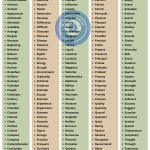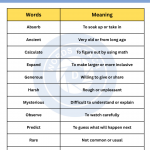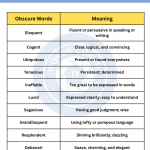Perfect Infinitive with Modals
The world of grammar holds a treasure trove of tools for expressing ourselves with precision. Today, we delve into the realm of “perfect infinitives” used with modal verbs. This dynamic combination unlocks a powerful way to talk about situations that are either unreal or completed in the past relative to another point in time.
Here’s the basic structure we’ll be exploring:
Modal Verb + (to have) + Past Participle
For example:
- She should have known better. (Modal verb “should” + infinitive “to have known” + past participle “known”)
What’s a Perfect Infinitive?
Imagine a verb form that combines the past (having done something) with the future (to do something). That’s the essence of a perfect infinitive! It’s formed with “to have” + the past participle of a verb (e.g., to have worked, to have finished).
Perfect Infinitives
Must Have + Past Participle
“Must have” + past participle is used to express a strong belief or certainty about something that happened in the past based on evidence or logical deduction. It indicates a high probability of a past action being true.
Examples:
- My wallet is gone! I must have dropped it somewhere. (Strong belief based on missing wallet)
- The house is spotless! They must have cleaned it before you arrived. (Logical deduction based on the clean state)
- It’s raining heavily, and the windows are open. It must have been raining for a while. (Inference based on current situation)
- You look exhausted. You must have had a long day. (Assumption based on appearance)
- The cake is half-eaten! Someone must have gotten hungry. (Logical conclusion based on the evidence)
- Your car isn’t in the driveway. You must have gone out. (Reasonable deduction based on observation)
- I can’t find my keys anywhere. I must have left them at work. (Strong belief based on missing item and usual location)
- The deadline has passed, and your report isn’t here yet. It must have gotten lost in the mail. (High possibility based on time constraints)
- There are muddy footprints all over the floor. It must have rained outside. (Logical deduction based on a physical sign)
- The library is closed, and all the lights are off. It must be past closing time. (Strong belief based on observation and usual practice)
Can’t Have + Past Participle
“Can’t have” + past participle is used to express a strong belief or certainty that something did not happen in the past based on evidence or logic. It indicates a high improbability of a past action being true.
Examples:
- She’s here already? She can’t have left very early. (Logic suggests she wouldn’t have arrived so soon if she left early)
- The milk isn’t spoiled yet. It can’t have been expired when you bought it. (Evidence suggests the milk was fresh)
- You aced the test without studying? You can’t have learned nothing at all! (Strong belief based on the outcome)
- The flowers are still fresh. They can’t have been delivered yesterday. (Evidence suggests recent delivery)
- The room is clean. They can’t have had a big party last night. (Observation contradicts the possibility)
- It’s only 10 am, and you’re already tired? You can’t have been up all night. (Timeframe contradicts the claim)
- He speaks perfect French fluently. He can’t have just started learning it. (Skill level suggests longer learning)
- The traffic is light. It can’t have been a busy morning commute. (Observation contradicts the possibility of heavy traffic)
- The book looks brand new. It can’t have been read many times. (Condition suggests infrequent use)
- They’re best friends now? They can’t have been arguing just yesterday. (Current relationship contradicts the possibility of a recent argument)
Should Have + Past Participle
“Should have” + past participle is used to express regret, missed opportunities, or unfulfilled obligations in the past. It conveys a sense that something different should have been done.
Examples:
- I missed the train! I should have left earlier. (Regret about not leaving on time)
- She failed the exam. She should have studied harder. (Missed opportunity to succeed)
- We argued with our friend. We should have been more understanding. (Unfulfilled obligation to be considerate)
- He forgot his presentation at home. He should have checked his bag more carefully. (Missed opportunity to be prepared)
- I didn’t take advantage of the discount sale. I should have bought that dress. (Regret about a missed opportunity)
- We didn’t call our parents yesterday. We should have called them on their anniversary. (Unfulfilled obligation to acknowledge a special occasion)
- She invested in a risky stock market scheme. She should have done more research. (Missed opportunity to be cautious)
- I ate too much dessert now I feel sick. I should have stopped myself. (Regret about an action with negative consequences)
- We didn’t visit the museum while we were in Rome. We should have taken the opportunity. (Missed opportunity to experience something)
- He didn’t back up his computer files. Now he’s lost everything! He should have been more careful. (Missed opportunity to prevent a negative outcome)
Shouldn’t Have + Past Participle
“Shouldn’t have” + past participle is used to express criticism, disapproval, or a negative consequence resulting from a past action. It indicates that something done in the past was a bad idea or a mistake.
Examples:
- You left the door unlocked! You shouldn’t have done that. (Criticism for carelessness)
- She lied to her friend. She shouldn’t have done that. (Disapproval of a dishonest action)
- They interrupted the speaker while he was talking. They shouldn’t have done that. (Disapproval of rude behavior)
- He ate expired food and got sick. He shouldn’t have eaten it. (Negative consequence of a bad choice)
- She spent all her money on clothes now she can’t afford groceries. She shouldn’t have been so impulsive. (Criticism of a financially irresponsible decision)
- We argued with our boss. We shouldn’t have been so disrespectful. (Disapproval of disrespectful behavior)
- He drove too fast in bad weather and got into an accident. He shouldn’t have driven so recklessly. (Negative consequence of a dangerous action)
- She revealed a secret that wasn’t hers to tell. She shouldn’t have done that. (Disapproval of a breach of trust)
- They skipped studying for the test and failed. They shouldn’t have been so unprepared. (Criticism of a poor decision and its outcome)
- He borrowed money without a plan to repay it. He shouldn’t have done that if he couldn’t afford it. (Disapproval of an irresponsible financial decision)
Needn’t Have + Past Participle
“Needn’t have” + past participle is used to express that something done in the past was unnecessary or could have been avoided. It conveys that there was no real need for the action.
Examples:
- You waited for me at the bus stop. You needn’t have done that, I could have walked home. (Action was unnecessary)
- She baked cookies when we already had dessert. She needn’t have gone to the trouble. (Extra effort was unnecessary)
- We panicked about the presentation. It needn’t have been so stressful, it went well. (The worry was unnecessary)
- He brought an umbrella, but it didn’t rain. He needn’t have bothered. (The action could have been avoided)
- She apologized for something that wasn’t her fault. She needn’t have done that. (There was no need to apologize)
- They packed heavy clothes for a trip to the beach. They needn’t have worried, the weather was warm. (The worry and preparation were unnecessary)
- I called you multiple times. You needn’t have worried, I was just running a bit late. (The worry and action were unnecessary)
- We brought extra money, but everything was already paid for. We needn’t have brought it. (The action could have been avoided)
- She explained everything in detail, but I already understood. She needn’t have gone through all that trouble. (The effort was unnecessary)
- He stayed up late studying for a test that was canceled. He needn’t have lost sleep. (The action could have been avoided and the negative consequence prevented)
Ought to Have + Past Participle
“Ought to have” + past participle is used to express regret, missed opportunities, or unfulfilled obligations in the past, similar to “should have.” However, “ought to have” often carries a stronger sense of moral obligation or missed duty compared to “should have.” It suggests a failure to do something that was considered the right or expected course of action.
Examples:
- He didn’t help his friend when they needed him. He ought to have helped. (Strong moral obligation not fulfilled)
- She didn’t stand up for herself when being treated unfairly. She ought to have spoken up. (Missed opportunity to defend oneself)
- They didn’t complete the project on time. They ought to have prioritized it better. (Unfulfilled obligation due to lack of planning)
- He didn’t apologize for his mistake. He ought to have taken responsibility. (Moral obligation to acknowledge wrongdoing)
- We didn’t visit our grandparents when we had the chance. We ought to have spent more time with them. (Missed opportunity to fulfill a family obligation)
- She didn’t follow through on her promise. She ought to have kept her word. (Unfulfilled moral obligation to be honest and reliable)
- They didn’t recycle their plastic waste. They ought to have been more environmentally conscious. (Missed opportunity to fulfill a social or environmental responsibility)
- He didn’t save money for the future. He ought to have planned ahead financially. (Unfulfilled obligation to be responsible)
- She didn’t speak out against the injustice. She ought to have used her voice. (Missed opportunity to fight for what’s right)
- We didn’t pay our bills on time. We ought to have managed our finances better. (Unfulfilled obligation to be responsible with money)
May Have + Past Participle
“May have” + past participle is used to express a possibility or uncertainty about something that happened in the past. It indicates that something is likely or possible, but not confirmed.
Examples:
- My phone is missing. I may have left it at the cafe. (Uncertain past action – possibility of forgetting)
- The firefighters arrived quickly, but the house may have already been engulfed in flames. (Possibility based on current situation)
- She didn’t answer your call. She may have been busy. (Speculation about a past reason)
- The package is taking a long time to arrive. It may have gotten lost in the mail. (Uncertain past event – possibility of something going wrong)
- The culprit left no fingerprints. The police may have a hard time identifying them. (Possibility based on evidence or lack thereof)
- The experiment yielded unexpected results. There may have been a mistake in the procedure. (Uncertainty about a past action causing the outcome)
- The car makes a strange noise. It may have a mechanical problem. (Uncertain past event – possibility of something being wrong)
- The deadline has passed, and your report is still missing. It may have been delayed for some reason. (Uncertain past event – possibility of an explanation)
- The library is unusually quiet today. There may be fewer people studying for exams. (Speculation about a reason for the current situation)
- They won the lottery! They may be celebrating right now. (Possibility based on new information)
Might Have + Past Participle
“Might have” + past participle expresses a lower degree of possibility about something that happened in the past compared to “may have.” It suggests a less likely scenario or a more tentative speculation about a past event.
Examples:
- I saw a flash of movement in the corner of my eye. It might have been a cat. (Very low possibility, could be something else)
- The meeting was canceled last minute. There might have been an emergency. (Less likely reason compared to other possibilities)
- She finished the test early. She might have known the answers beforehand. (Speculation with a lower degree of certainty)
- The traffic is unusually light. There might have been an accident on another route. (Tentative explanation with a lower chance)
- The flowers are wilting. They might have not been watered recently. (Uncertain past event with a lower possibility of the opposite)
- He missed your call. He might have been sleeping soundly. (Less likely reason compared to being busy)
- The project seems incomplete. It might have not met the deadline. (Speculation with a lower degree of certainty about completion)
- The customer seemed unhappy. They might have received the wrong product. (Tentative explanation with a lower chance of other reasons)
- The book is missing from the shelf. It might have been borrowed by someone. (Less likely reason compared to being misplaced)
- The lights are flickering. There might have been a power surge. (Speculation with a lower possibility of another explanation)
Could Have + Past Participle
“Could have” + past participle expresses several possibilities about something that happened in the past. Here are the main uses:
- Possibility: It indicates that something might have happened, but it is not confirmed. It suggests a range of possibilities without a strong leaning towards one specific outcome.
- Missed Opportunity: It conveys that something was possible to do in the past, but it wasn’t done. It highlights a chance that was not taken.
- Unfulfilled Obligation: It suggests that something should have been done in the past, but it wasn’t. It expresses a sense of missed responsibility or duty.
Examples:
Possibility:
- I didn’t hear my phone ring. It could have been on silent. (Uncertain past event – one of several possibilities)
- The thief left no trace. They could have escaped through the back door. (Speculation about a past action)
- She’s late again. She could have gotten stuck in traffic. (One possible reason among others)
- The test was surprisingly easy. It could have been a mistake. (Possibility of something being wrong)
- The computer won’t turn on. It could have overheated. (One possible explanation for the issue)
Missed Opportunity:
- We didn’t invest in that company. It could have made us a lot of money. (Missed chance for a positive outcome)
- She didn’t apply for the scholarship. It could have helped her pay for college. (Opportunity not taken)
- They didn’t take advantage of the discount sale. They could have saved a lot. (Missed chance to benefit)
- He didn’t study for the exam. He could have done much better. (Missed opportunity to succeed)
- I didn’t take that trip to Europe. It could have been a life-changing experience. (Opportunity for a positive experience not taken)
Would Have + Past Participle
“Would have” + past participle is used to express several hypothetical situations or unrealized possibilities in the past. Here’s a breakdown of its main uses:
1. Contrary-to-Fact:
This is the most common use. It describes a situation that did not happen in the past, but the speaker imagines what would have happened if things had been different.
Examples:
- If I had studied harder, I would have passed the exam. (Didn’t happen, but imagining the positive outcome)
- We would have gotten lost if we hadn’t used a GPS. (Didn’t get lost, but imagining the consequence)
- She wouldn’t have gotten sick if she had dressed warmly. (Didn’t get sick, but imagining the negative consequence)
- The movie would have been a lot funnier if the main actor had been different. (Wasn’t funny, imagining a different outcome)
- They wouldn’t have finished the project on time if you hadn’t helped them. (Finished on time, imagining the negative outcome without help)
2. Habitual Action in the Past:
This usage describes a repeated action that would have happened in the past under specific circumstances.
Examples:
- Every morning, she would have made coffee before starting work. (Habitual action in her past routine)
- Whenever it rained, they would have stayed home and played board games. (Habitual action based on weather)
- He would have always called his mother on her birthday. (Habitual action on a specific occasion)
3. Polite Request in the Past:
In some cases, “would have” can be used to express a polite request that was not made directly in the past.
Examples (Note the implied politeness):
- Would you have liked me to close the window before I left? (Suggesting a helpful action not taken)
- He would have appreciated it if you had called him beforehand. (Suggesting a missed opportunity for courtesy)
That’s a wrap! We’ve delved deep into the world of modal verbs and perfect infinitives, exploring how they work together to express a variety of nuances in past and unreal situations. From obligation and possibility to regret and missed opportunities, these grammatical tools can add depth and precision to your writing.





